
Hey kids, so thrilled to sit in with artist/innovator/director Michel Gondry to discuss Thorn in the Heart, his documentary about the life of his 84-year old aunt Suzette Gondry, a teacher in rural France. Along the way we have a visit from Gondryís son, Paul, and discuss sexism, racism, Satanism, bad words and avoiding show biz thinking.
Dig it!
Thorn in the Heart
Michel Gondry
 The
Lady Miz Diva: What was the inspiration that caused you to say, ĎI
think my aunt would make a great subject for a documentary?í
The
Lady Miz Diva: What was the inspiration that caused you to say, ĎI
think my aunt would make a great subject for a documentary?í
Michel Gondry: Itís my son, actually. He told me when she came here in 2004, when I was shooting Eternal Sunshine {of the Spotless Mind Ė 2004} she started to tell him her stories and he said, ďDad, you have to make a movie about Suzette.Ē So, I obeyed my son.
LMD: Has Suzette seen the completed film?
MG: Suzette, of course. She was very sad in the beginning, especially when she saw the title because she immediately realised I was using all this footage when she was really upset. And she thought I was just focusing on the negative part and I had to write to her later to explain to her that was my way to show her, who she was really, and I think people like her. And then we showed it - not to all my family yet - but we showed it to the village, which was a harder confrontation and it went so well. It brought people back together and it was a very warm moment. It was very nice. People really appreciated that we talked very openly about things that most people cannot in their family. Especially in this part of France, people areÖ as much of this country is beautiful, itís very harsh. People are very enclosed and they donít communicate very much.
LMD: Has your cousin, Jean-Yves seen it?
MG: Yes, of course. For as much as itís tough on him, he enjoyed it because of the attention. My son is gonna see it tonight. He doesnít jump to see my work; he wants to be his own person. Heís right there, heís 19.
{Gondry fetches his son, Paul}
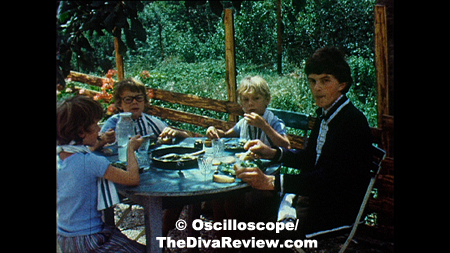 LMD:
When was this documentary shot? When we see Paul, heís much smaller.
Paul, what do you remember about the film?
LMD:
When was this documentary shot? When we see Paul, heís much smaller.
Paul, what do you remember about the film?
MG: We shot over five years. Not every day.
Paul Gondry: I remember like, me fucking aroundÖ
MG: What?! What was that word?
PG: I was goofing aroundÖ
MG: Yes. I prefer that!
PG: I was satanic at the time, so I was having crazy rituals at the house like drinking blood, crazy stuff. The house was very gothic, which was hilarious and Suzette was always like, trying to take care of me and I dunno, I have some funny memories about that.
LMD: Paul, do you remember being the inspiration for the documentary?
PG: Me?
MG: Yeah, you told me. You remember you told me at the restaurant, we ate crepes with Suzette? You remember you told me you have to make a film about Suzette?
PG: Oh yeah!
LMD: Why did you feel that way?
PG: I think she had a lot of interesting stories. She was like an old book, you know?
MG: Donít call her an old book.
PG: In a positive way, you know? I discovered another story every day, it was interesting to me.
MG: Paul is like me when I was his age; we like to hear different stories. Some kids in my classroom, they had no respect for the teacher. Paul has the same thing {as I}, he respects stories and history.
LMD: What was Suzetteís reaction when you approached her about doing a story on her life?
MG: It was not supposed to be on her life, it was supposed to be on her professional life. She was very strong about it. Thatís why it took so long before I could really get her to talk about her personal life.
LMD: Is Suzette your aunt by marriage?
MG: Yep! No blood. No genes.
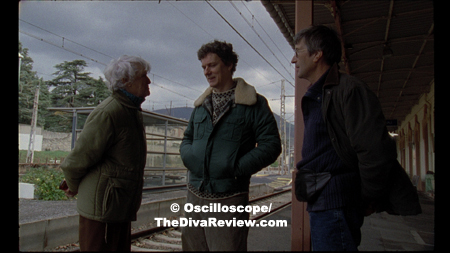 LMD:
Itís funny because in the scenes where youíre standing together, you
look so much alike.
LMD:
Itís funny because in the scenes where youíre standing together, you
look so much alike.
MG: Yeah, I know! Yeah, I look more like her than her son looks like her, itís funny. Sometimes when people spend time together, they have the same expression by imitation.
LMD: You also have a very mother and son vibe in those scenes.
MG: I thought of that in the scene when Jean-Yves leaves the table, I said, ďSo, you can talk about your husband now?Ē She said, ďI still feel guilty.Ē I said, ďIs it because you feel guilty that you canít speak?Ē And she said, ďYeah,Ē and then he leaves the table and Suzette kept talking, so then I kept the sound because I wanted it to feel like he was leaving out of this role and then we see Suzette and I together and itís like Iím sort of taking his place. And I think maybe sheís the motherÖ I spend more time with her than my mum now and she probably enjoys my company more than her son. And I think you donít choose your parents and you donít choose your children in a way. Itís nature that provides that and then maybe in life you choose people you like to spend with and that shows that.
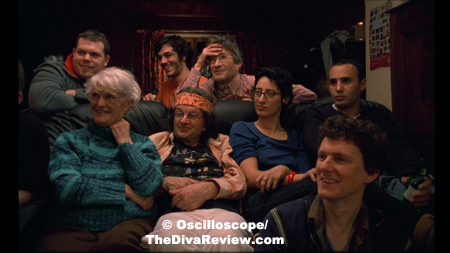 LMD:
What do you think audiences will take away from this study of Suzetteís
life?
LMD:
What do you think audiences will take away from this study of Suzetteís
life?
MG: Well, itís the most simple thing. First of all, some people may think, ďWhy would you do a documentary about anyone like that?Ē And I think itís a little bit show business thinking. I read one guy who gave me a bad review saying, ď85 percent of peopleís lives are boring and thatís why we invented entertainment.Ē I think this is very flattering for me to hear this, because I believe exactly the opposite. I think that in 85 or 99 percent of movies we see are people who are already in the light. We never film people who are not in something publicly. Even if you do a documentary, itís most of the time on somebody who has achieved something, thatís already famous. Iím not the only one to do a documentary of people in my family, itís been done many times, but I think filming people for who they are, regardless of their achievement, itís very interesting. Not to say my auntie has achieved a lot; she taught a lot of children, but she had failures like everyone. What I hope is that people will see that, they donít feel so bad about their own family. Each family has problems, they donít look at or people stop talking and then life goes by and then you donít see each other and then you die and itís horrible. So by people seeing {the film}, they wonít think that their family is worse.
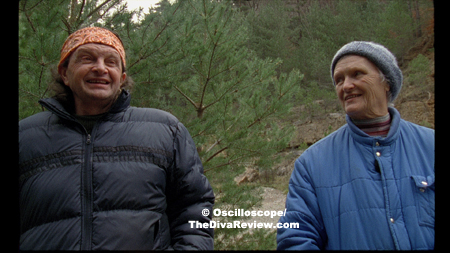 LMD:
But did you learn anything new?
LMD:
But did you learn anything new?
MG: Well, I clarified a lot of doubts I may have had on Suzette and I understood what was going on. I understood why it was hard for her to stand her son, because heís a pain the neck! For as great as he is, you really have to deal with him. He went to visit me in Los Angeles for two weeks and I was happy when he left. I mean, some people, you like them and youíre happy when you say goodbye, too, because you canít breathe. Some people are so much in need that they wonít let you think! Like I was trying to shoot the film and he was asking me questions every 10 seconds. So, I found this guy while I was shooting who was very, very talkative and he liked to speak French, so I was like, ĎOh great!í I introduced him to Jean-Yves, and then they kept talking to each other and the guy ended up visiting France and Jean-Yves. So it was perfect, but some people need so much attention. Suzette and I are getting along because I donít mind her telling me a story and she doesnít mind sometimes not saying anything for hours. When my father passed away, I was staying with her at this house and we took a 3-hour walk and we didnít say one word. It was very comforting. In this part of France nature is very preserved and there is no tourism. Itís very protected and itís very difficult to access. People always think of the French Riviera or the arts, but they donít think of those mountains, which are older mountains or a little more round, but amazing. So you have this sense that no matter what happened it would be the same always. Itís comforting.
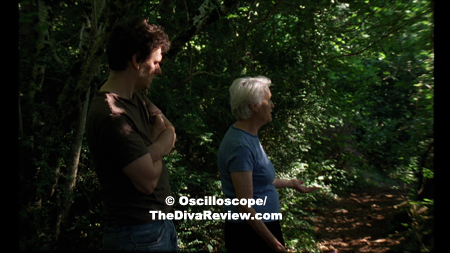 LMD:
One of the most interesting parts you capture in Suzetteís career is
her time spent teaching the Algerian children at a time when they were
outcasts in French society. Then she further insists on teaching the
Algerian girls, which was taboo in their culture. What drove her to do
that?
LMD:
One of the most interesting parts you capture in Suzetteís career is
her time spent teaching the Algerian children at a time when they were
outcasts in French society. Then she further insists on teaching the
Algerian girls, which was taboo in their culture. What drove her to do
that?
MG: Itís very interesting. Her personality, her nature is very specific, like sheís part of a very mature environment. In this country, this mountain, in the past women would not sit at the table at dinner; they would stand in the kitchen while men would be eating. Maybe about 50 or 100 years ago, but that was in the blood, in the culture. She sort of respected that, like she really worked very hard for people, she worked for her husband, but yet sheís a suffragette in her own way. Sheís a very strong woman and I think that makes her atypical. So, there is this tolerance to go and teach those people who are not necessarily welcome. But like every liberation war, like the war of Algeria when Algeria kicked France out of their country, then there is same story with the Americans with Laos, or Vietnam where people fought on the side of the country who was invading. So, her kids were Algerians who fought on the side of the French, so when the French lost the war, they had nowhere to go because they would have been killed in their country. So they were in France, they were in camps and it was interesting because we in editing, we showed this guy who had this great experience, but we had his cousin, who had a terrible experience with France and his was very bitter. I think he was really resentful because he never found a job really and he was really frustrated.
But to conclude the question, as much as she was tolerant to accept, to teach those kids who nobody wanted to teach, she was saying, ĎHere in France, French girls go to class.í And then she insisted and it was a big scandal, the fathers were upset about it, but she insisted. So it was sort of a clash of the intolerant and being progressive and strong. Itís a problem in France about people who donít want the women to wear the scarves in school and we never talk about the real issue. Itís become black and white and you have to decide a camp, so I never want to be giving my opinion on this problem because itís too complex. But I liked her atypical position like really a strong woman, but really respecting. For instance, she treats me like a king when I visit her. Everybody has to work but me and sometimes I feel embarrassed, because whenever anyone argues against me, she always takes my side. And sometimes after we did the documentary and she felt I had pushed her a little bit in a place she didnít want to go, she looked at me for the first time with those eyes that I can see her looking at other people. And I was glad because I felt I had privilege and I felt guilty about those privileges.
~ The Lady Miz Diva
March 15th, 2010
© 2006-2022 The Diva Review.com
|
|






